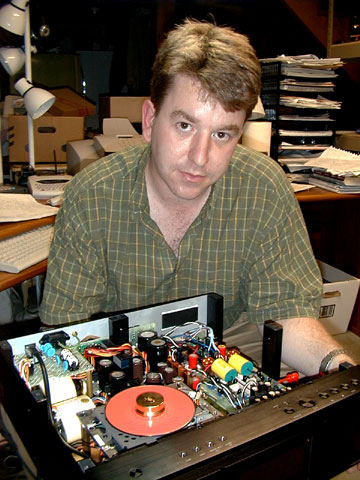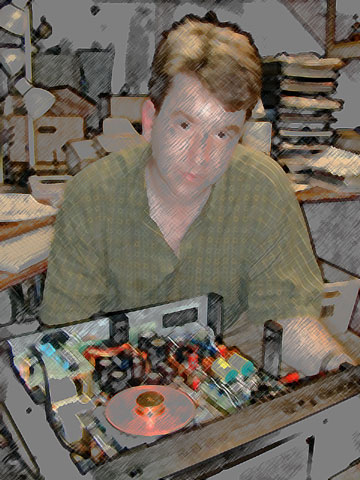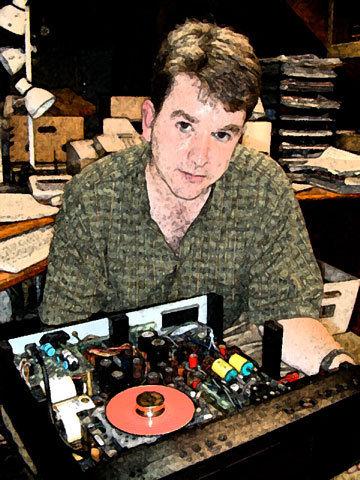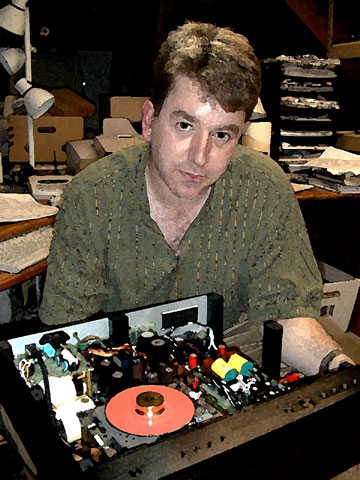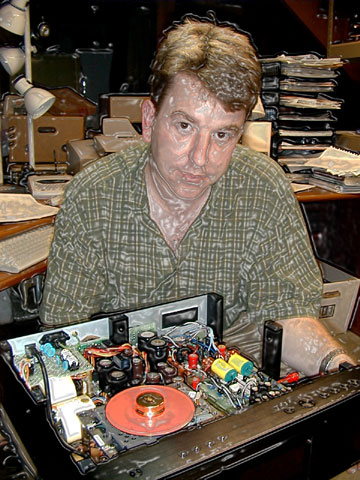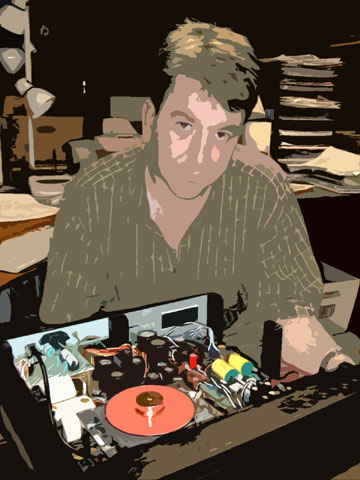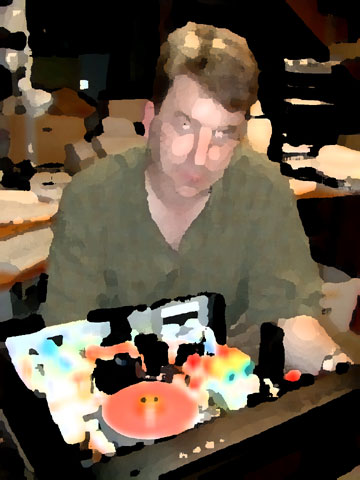|
You are reading the older HTML site
Positive Feedback ISSUE 6 Positive Feedback Online interviews: Dan Wright of ModWright
(All photographs and image processing by Robinson) [In February of 2003 Dan Wright and I had a conversation about the work that he's doing at ModWright, his company that does various audio modifications, especially on digital source components. An edited transcript of that conversation follows...]
Wright: Hi, this is Dan Wright. My company name is ModWright. ModWright is a company specializing in audio modification. Our mission is to provide truth in audio, to provide options for all audiophiles at all levels and all income levels. One of our goals is "audio alternatives for everyone." Robinson: What is the entry price level as far as you are concerned? Wright: I won't touch a job for under $300. That was not always the case, but that has become the case given what we are doing. We try to cater to both the budget-minded as well as the true enthusiast, where budget is not an issue. We try to cover both ends and everything in between. Robinson: When was ModWright formed? I have been aware of you for a few years, but when did you get started? Wright: ModWright was legally formed in 2000. I am scratching my head here thinking—yes, it has been three years now. ModWright has been my primary business and primary source of income from August of that year. Prior to ModWright becoming an entity, I was doing this as a hobby and enthusiast for several years prior. Robinson: You started out as a hobbyist then? Wright: Yes. Robinson: There is a definite difference between the world of a hobbyist, a person who is pursuing an avocation, and a person who makes the decision to become a professional. How did you make that decision?
Wright: It was almost accidental. I thank the Internet and I thank word of mouth for it to be possible. It started out with me wanting to make my budget gear better, and not wanting to spend a fortune. I knew about mods and I said "I think I could do that myself." Basically, I just started working with it. My background in mechanical engineering helped, I guess, but I can't really attribute what I was doing as a vocation having that much to do with audio. Robinson: What did you do prior to audio? When you say "mechanical engineer," what was your education and professional background? Wright: I have a four-year degree as a mechanical engineer. I am a registered professional engineer. Primarily, I was doing heating, ventilation, air-conditioning system design which is basically heating equivalent system designed for new construction, re-designs, retail, schools and number of different things. I had seven years in industry doing that. I can't really say that I had an electronics background in that respect. Every engineer has a general background in power and electronics, etc. It was purely hobby motivated, and I was very passionate about it. The Internet helped in dispersing the information in both my learning and my ability to share. I had no interest financially initially. Someone approached me about doing some basic things for them and it snowballed from that point. I made a few dollars for parts to do my own things to finally I said, "This could be a legitimate business." Robinson: How far back does your interest in audio extend? Wright: Seriously, for about 10-11 years from the standpoint of actually buying a decent system. Prior to that, I have always appreciated a good audio system and enjoyed music. Robinson: So you had some background in audio well before you became a professional? Did you ever find yourself sitting around thinking about doing this, or did you wake up one night and say, "This is it, I am going to go this way"? Wright: I say it snowballed because it kind of snuck up on me. I was enjoying what I was doing. I was very passionate about it. I often thought that if I could make a living doing this it would be wonderful, but I consciously kept my day job even after I started the business, with the intention of hopefully being able to do that. I found that 2/3 of the way into that first year it was very plausible, and I haven 't looked back. Robinson: How did your wife take this? Wright: She was very supportive, actually. It was very good. In fact, the following year she started her own business and for a time we were really out on the ragged edge. She followed through with it, but the business didn't work out. She was very supportive, and financially the transition was seamless, fortunately. That made it possible. Robinson: Obviously you are doing well enough to pay the bills and keep things rolling. Wright: Yes, we are currently turning away a fair amount of work, which is good. Robinson: Let me ask you a different question, Dan. You have been interested in audio for 10-11 years. You have been in the Portland area, and I know that you have had contacts with people in the Oregon Triode Society and elsewhere. If someone were to ask you, "Who are your mentors, who are the people who really made a difference to you, and from whom did you learn about the audio arts?" who would you point to? Wright: Interestingly enough, Rick Schultz was the first person that I knew about who did mods. While I can 't attribute anything to him as a mentor, per se, what he was doing and his enthusiasm kind of opened my eyes to the possibilities. Robinson: That is Rick Schultz of EVS, right?
Wright: Yes. Once I started doing my own work, the one person who really significantly has been a good mentor, has shared a good deal of information with me, and taught me a good deal was Jennifer Crock of JENA Labs. We collaborated on a project, an SACD project, and it was wonderful. There has been a good amount of sharing and education that I have been very grateful for. Robinson: That project that you and Jennifer worked on involved what? What specifically were you doing on SACD? Wright: Specifically it was her idea initially to put tubes in an SACD player. In fact, the initial idea was to design a balanced tube analog stage for the SCD-1. That is a project that is still in the works. It is something she is still working on as far as I know. It evolved into a single-ended design for the XA777, which is the player that I had. At that point, my knowledge of tubes and tube design was minimal, and I was working on digital mods. She knew these designs very well, so she designed a single-ended circuit that together we made happen. I got my hands dirty and incorporated her design into the unit. With her help, we really produced something special. Robinson: The idea was to tube the output stage, to be specific? Wright: Exactly. Exactly. Robinson: ..and to bypass all of the interesting things that are in the path? Wright: Yes. Robinson: I know that the balanced output for the SCD-1 has a particular reputation for being... Wright: Yes, the balanced output from that particular player actually adds more to the signal path component-wise and degrades the signal path more than the single ended circuit. Without going into details, that's the truth. The idea was to replace as much of the solid state, some discrete largely op amp base circuitry with tubes. Elegant design, low distortion, zero feedback. These were the goals. Robinson: How has the response been to the modded units you put out there? Wright: The response to the single-ended mods of the XA777 and the SCD-777 have been excellent. There is still a definite interest in the balanced. I have left that ball in Jennifer's court. The interest has been good and we have had quite a number of people having it done. There have certainly been spin-offs from that. Robinson: How would you describe the benefits that your mods bring to the sound of the 777? Wright: With the SCD-777, the words I would use to describe it are transparent, fast, clean, dynamic, with some warmth. Basically, it is a matter of achieving detail and resolution without an overly etched or bright presentation. Warmth, but not at the expense of detail. That has been the goal. I feel that with the tube that was used, the type of circuit that was used, and the way it was implemented, that we are able to really produce some very special sound. Robinson: Specifically, which tube are you using on the output section now? Wright: The tube we are using is the 5687 tube. This is a tube that Jennifer Crock introduced me to. It is not a current production tube; it is a military spec tube. As such, it has very tight tolerances as far as design and manufacturing go. We are using stock tubes pretty much exclusively. It is a unique tube in that it is very linear. It runs very high current and consequently runs very hot. It is simply a very robust and very unique tube in how it operates. Sonically, it is not characteristically "tubey," in that there is some warmth but it is a very clean, undistorted sound. Robinson: I have always had an interest in the audio arts as such. There are clearly some people operating at the level of mastering the audio arts. What about the newbie who comes to town, the person who, like you did, says "I would like to get into fine audio"? How do you become a craftsman? What is the entry point? How do you get into this field?
Wright: Speaking for myself only, it was a matter of starting out with your budget gear. Learning what I could, and getting my hands dirty. You are going to blow stuff up and break stuff. If you are afraid to fail or make a mistake you are not going to get anywhere. It does not cost a ton of money to pick up a piece of budget gear and learn how to make it better. The Internet is an amazing resource. Technology today is such that you do not have to spend a fortune to get good sound. Certainly as a craftsman there are things you can learn about how to undo the corners that were cut by the manufacture. That is quite often what is involved. Robinson: Righting the wrongs and all the rest of that. Wright: Basically, yeah. Robinson: Is there a school or a college or university that you can go to, or is it mainly "the school of hard knocks"? Wright: It is mainly "the school of hard knocks," and the school of the Internet. It depends on the individual. Certainly with the background in engineering I had, I didn't come to this cold. You have to be able to problem solve and have a certain amount of creativity. You have to be passionate about music, about audio and about what you are doing. If that is there, you are good—because the passion and interest are what will drive you. This is not about getting rich. This is about being passionate about what you are doing. If you make enough money to survive doing it, that is great. Robinson: We want to make that clear. Let no reader think that we are going to make a lot of money going into fine audio! Wright: Right! Robinson: Let's shift gears and take a look at digital audio. Clearly you have had a focus on digital for quite a while. How did you become interesting in improving things digital? Most people assume that digital is just a closed box. Wright: At my age, 33, vinyl was not something I was exposed to. Nowadays digital front ends are very inexpensive. I was working with a $200 DVD player. It seemed really intimidating, but I found that certainly little things made a big difference when you are dealing with the source, particularly a digital source. There are so many simple wrongs that need to be righted to make digital sound good. So I guess that the reason I started out with digital was again because the products were inexpensive and just lent itself to modification. Modifying an amplifier or something like that is a little more intimidating from the standpoint of power and physical risk. So I guess that is largely why. It was not one of those things that I set out and planned to do. Having said that though, I should say that much of the modifications on digital gear had to do with the power supply and analog circuitry. They are not so much dealing with the ones and zeros of digital data — with some exceptions. Largely you are dealing with cleaning up power supplies and improving analog stages, as well as doing things that reduce jitter. That is a digital issue. Robinson: On the subject of SACD, if we step from DVD players and CD players to SACD, how did you become involved in SA? This seems to be what you are pretty heavily involved with now…
Wright: Well, it was largely a business decision from the standpoint of a new technology. I had heard it and was impressed by it. At the same time, at that time there was not a lot of software available. It made sense to pursue mods to SACD players that were also good CD players. As I got further involved in the mods and I became more and more impressed with SACD, it was a no-brainer. I fully and whole-heartedly support the format now based on my experiences with it. The thrust of all of our mods have been to take a player that is a great CD player but also plays SACD 's and make it better. We make it a great CD player and a phenomenal SACD player. I think some people think they have to buy an SACD player only to play SACDs, but much like DVD players became our primary digital source to play CD 's and DVDs, I think you are going to see the majority of CD players now having all three abilities: DVD, CD and SACD. Robinson: On the subject of SA, I am curious as to what do you see as the main virtues—the strengths—of SACD? Why do you see it as worth pursuing? Wright: Sonically SACD is the least offensive digital format. Robinson: Ah, "least offensive"! Wright: If I can put it an almost a negative context there. Making digital sound good is about removing negative artifacts, at least in my opinion. Poor digital sounds aggressive, sounds harsh. Poor analog is less offensive than poor digital. Certainly digital has the potential to be wonderful and SACD is the shining star of what digital can do. The higher sampling rate gives a more analog-like reproduction obviously. There is simply more information there. If ultimately what we are about is "truth" in audio—to me "truth" is just getting down to the music. What it really should sound like. SACD is the closest digital format I have heard do that. Robinson: There are a great many people who agree with you on the subject. Certainly SACD has become very popular. We are still not quite sure which of the two higher resolution formats will win out, although, from my standpoint, SACD seems to have a substantial head start. It is one that I don't know that DVD-A could overcome. My listening impressions have been pretty definite. I would agree with you that DSD and SACD do get us closer to the music than we have ever been before. It is certainly the best thing I have heard, right there with the very finest vinyl rig as far as the ability to be pleasing, and even closer in certain ways to open reel master tape. Let me ask you a different question, Dan, one pertaining to ModWright. What kind of modifications do you do? You said that in general you do this, and you mentioned the tubed output stages. If someone were interested in having you work on their player, what sort of things can you do?
Wright: There is a real range, starting from the most basic, straightforward parts upgrades to improve the sound of the player and address the weak points of the power supply, the analog stage, etc. At the $300 price point, that is what we are doing. We are taking a budget to mid-level player and we are addressing what I feel to be the weaknesses: the power supply, the analog stage. In doing a few key things, upgrading a few key parts, you can certainly address those things. The next step is to not just replace parts and address weaknesses in that regard, but redesign circuitry, remove portions of circuitry, and "right the wrongs," rather than just trying to put a band-aide over what I feel to be weaknesses. At the other end of the spectrum, we are adding whole new analog stages, be they tubed or what-not. The intention is to provide a whole range of offerings, from the basic to the advanced, and consequently at different budget levels. Robinson: You can take someone who only has a few hundred dollars and has a rather inexpensive player and just wants to take that as far as it can go, all the way up to people who have pretty expensive players and are looking for the greatest bang for the buck out of that particular platform, then... Wright: Exactly. Say an individual has a $500 player, likes it, but considers selling it and buying an $800 or $900 player. For the same additional cash investment, I feel that modifications can significantly improve the player in such a way that the return on investment is much higher then selling that piece of gear and buying something at the next level. That is what we are all about, trying to provide the best value for their dollar. Robinson: My experience has been that you are quite often better off modifying. If you are brave and willing to invalidate your warranty and all the rest, you are better off to take a good platform and invest in modifying it than you are to sell it and go buy something that is more expensive but also stock. I don 't think that you can buy a higher priced stock unit that will exceed the price-performance that you get when you modify. Do you find that most of your customers feel that way? Do you ever have disgruntled customers who say, "Man, that wasn't good enough"? Wright: I have honestly had less disagreeable experiences than I could count on one hand. We are talking probably close to 700 transactions now since the business was conceived. You can't please everybody all of the time. Better than 99% success rate I feel pretty good about. The bottom line is that if people are not happy, we do what is necessary to make them happy. Again, some people you cannot please. Ultimately, I am about providing good service, good products and making the customer happy. I want the return customer. Robinson: Tell me about your pricing structure. What is entry level, what's midrange and what's "no-holds-barred" at ModWright? Wright: In terms of dollars and cents, the basic entry level mods probably start at $300. If people ask me about custom mods for something we haven't done, I typically tell them that for a typical player it starts at $300-400. If they want it with exotic parts or they want significant redesign or what-not, the price would go up. In terms of a pricing structure, it starts at $300; currently our most expensive mods probably top out at a little more than $3,000, with plenty of options in between. I have one custom job that is closer to $5,000, but that is not really characteristic of the pricing structure. Again, I am trying to address the various options or various system levels and customer interest. Robinson: Tell me about your plans for the future. Where do you see yourself going? Do you have any projects that are in the works that you can mention to use?
Wright: The tube mods that I started working on with Jennifer Crock have been very exciting and were very successful. These ideas have morphed into other players and other mods that we are doing with the Philips SACD 1000. I am moving towards the direction of redesigning circuitry and developing our own circuits, both solid state and tube. I see our mods taking a direction in which you could send us a player, and we would offer you a major circuit option or a parts upgrade. We may offer two levels, with the redesign at X dollars and the redesign plus the blank gates and fancy parts at additional costs. That is what we are doing with the Philips. What that is leading to ultimately is some ModWright products. Nothing is set in stone. I have ideas, potentially a player, and potentially a phono stage, although that is very premature. There are a few other ideas that I have, largely involving tubes because that is what I enjoy. I would hope that by the end of 2003 there would be at least beta testing of products that have our name on them and have been manufactured by us. Robinson: We have just finished listening to the Phillips SACD 1000 as you have modified it with the 5687 output tubes, and it sounds very impressive. Can you tell us how you came about this idea? There is a lot of interest in that Model 1000. Wright: Basically, the type of circuit is the same as was used in the Sonys. The tubes are the same. The Philips SACD 1000 was initially introduced at $2,000 and had a good reputation. At that price point it was the same as the Sony SA777. I liked that player so the Philips didn't really interest me. When the price drop occurred it stirred my interest, because all of the sudden the player is an extremely good value. It was available for $1,000 and then towards the end it was available for $400. I had a couple of customers interested in having mods similar to the Sony implemented in the Philips. The Philips had its own set of challenges and own options. So what has evolved is a mod that does render a multichannel player as a two-channel unit but features a tubed output stage. The DACs are paralleled. In this case, we completely abandoned the analog stage. It was really the most aggressive and most exciting mod for us in terms of the extent of changes to the stock unit. Robinson: Because essentially you cut lose after the DACs... Wright: Right. We use the power supply, the transport and digital circuit up to the DACs. Everything after that is abandoned. It can even be configured with a built in attenuator such that the tubed analog stage essentially functions as a line stage which makes it extremely versatile and cost effective. Robinson: Where do our readers go to find out more information about what you are doing and to find out more about ModWright? What is the web address? Wright: The web address is http://www.modwright.com. We are also available by phone, 503-288-5159. I try to answer the phone personally whenever possible. You can email us at [email protected]. |

